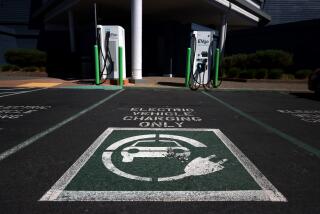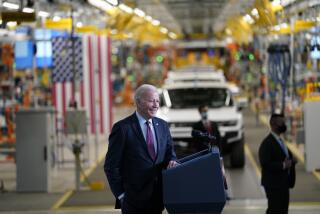Hold Firm on Gas Efficiency
- Share via
President Bush can warn all he wants about dependence on foreign oil jeopardizing U.S. national security. It won’t prevent automakers from screaming bloody murder about a federal proposal to make SUVs roll a measly 1.5 extra miles on a gallon of gas.
The American public steers this drive toward waste with its willingness to plunk down $50,000 for a tank-size vehicle that can’t make it from Long Beach to LAX on a gallon. Electric vehicles are marketing history, hybrid engines are still a niche and the hydrogen engine is way in the future. For fuel savings, the gasoline engine is still the big target.
A recent article in the MIT alumni magazine, Technology Review, asserts that a series of gas-saving innovations, many already available, could boost the average fuel economy of U.S. cars to 46 miles per gallon, from 27 mpg now. Sport utility vehicles could nearly double their gas mileage, to 40 mpg. That would save more than three-fourths of the U.S. oil imported from the Middle East, according to the Union of Concerned Scientists, and cut U.S. greenhouse emissions by nearly a third.
Instead of expensive, exotic new fuels, all the changes involve refinements to standard internal-combustion vehicles. For example, software-driven controls would replace the fuel-wasting camshaft for opening and closing valves. A continuously variable transmission would provide an infinite range of gear ratios. A new starter-generator could allow an engine to turn off at a red light, then almost instantly start up when it turns green.
Automakers already are tinkering with these gadgets. General Motors has installed the variable transmission in its Saturn SUV. Ford has been testing valve systems and plans to install a starter-generator in its 2004 Explorer. But instead of committing to broader-scale changes, the industry complains about any nudge from government.
The new technologies combined would cost up to $2,000 a car, said John Heywood, director of MIT’s Sloane Automotive Laboratory. Savings on gasoline would pay for that within a few years -- in less time at the rate pump prices have been going up.
Bush should certainly stand firm behind the National Highway Traffic Safety Administration’s very, very modest proposal to increase fuel economy in SUVs and other light trucks to 22.2 mpg by 2007. He could lead the nation to a quicker, more fundamental shift with tax policies that reward motorists who trade in gas gulpers for sippers. There’s nothing like consumer demand to make the free enterprise system start enterprising.






